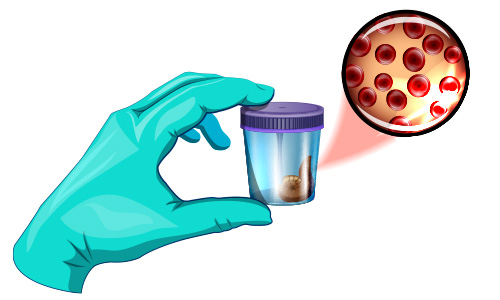A faecal occult blood test (FOBT) checks for hidden blood in your stool sample. It is a common screening method for colorectal cancer or other underlying conditions that cause bleeding in the digestive tract.
As FOBT can only detect the presence of blood, additional tests will be required to determine the source of the bleeding.
What happens during a faecal occult blood test?
There are two main types of FOBTs to collect and test stool samples. They are:
Immunochemical Faecal Occult Blood Test (iFOBT or FIT)
This test involves the use of a spatula or brush to collect your stool sample before sealing it with a container for lab testing. It does not require any dietary or drug restrictions before sample collection.
Guaiac Faecal Occult Blood Test (gFOBT)
This test involves the use of an applicator to brush your stool sample onto the provided test card before sealing it with a container for lab testing.
To ensure an accurate test result, your doctor may advise you to avoid certain foods and medications three to seven days before doing this test. These restrictions include:
- Red meat such as beef and lamb
- Certain vegetables such as broccoli and cauliflower
- Vitamin C and iron supplements
- Non-steroidal anti-inflammatory drugs (NSAIDs) such as aspirin and ibuprofen

What do the faecal occult blood test results mean?
A negative result indicates no presence of blood in your stool sample. However, your doctor may recommend regular screening if you are at average risk for colorectal cancer.
A positive result means there is blood in your stool sample. Blood in the stool may indicate a sign of colorectal cancer or other conditions, which include:
- Colon polyps
- Diverticular disease
- Haemorrhoids
- Ulcers
Additional tests, such as a colonoscopy, will be required to examine your digestive tract and determine the source of the bleeding. Consult your doctor for more information on the diagnosis and treatment options.
When should I get a faecal occult blood test?
Colorectal cancer can be prevented through early detection and intervention. Annual screening is recommended if you are above 50 years old or have a family history of colorectal cancer.
You may also be required to get a FOBT if you are diagnosed with anaemia. The test results can determine if your anaemia is caused by stomach ulcers or bleeding from the digestive tract.
You do not need to take a FOBT if you already have symptoms such as rectal bleeding or altered bowel habits. Consult a doctor who will likely follow up with a colonoscopy to diagnose your condition.
What are the risks involved with a faecal occult blood test?
There is no physical risk involved with FOBT. However, the test has limitations and is not always accurate in detecting cancer.
A false-negative result may occur when your polyps do not bleed even though cancer is present. You may also get a false-positive result due to bleeding from other sources such as stomach ulcers or haemorrhoids.










